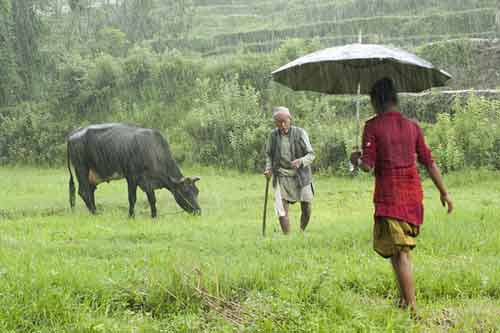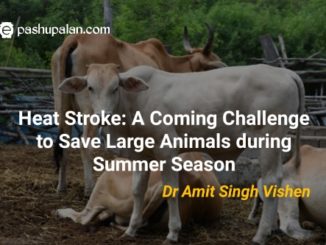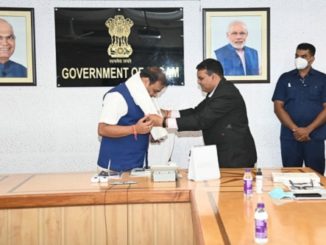In hot summer, news of onset of monsoon provides relief to mankind but at same time it warns of the prevalence of diseases which can cause economic loss to the farmers .Certain precautions need to be taken care in advance to avoid the setbacks and maintain production level of lactating animal. Protection of animal from inclement weather (wind, heavy rain, hail) helps animal to maintain immunity and remain healthy. The common problems encountered in milch animal and their amelioration has been discussed here:
Feeding
After hot climate the fall of rain promotes the sprouting and growth of grasses which may include the poisonous ones also. These grasses are mostly fibrous and succulent which when consumed by animal lead to less nutrient intake and watery dung which becomes cause of negative energy balance. Do not allow animal to graze for long distances as it may cause stress in animal. Grasses/fodder which is to be fed should be chopped and dried to reduce moisture content and increase dry matter before feeding the animal. At same time feed should be checked for antinutritional factor and any poisonous content.

Drinking water
Contaminated water consumption by animal is source of infection .Clean water should be made available to animal which should be frequently changed. Reduction in water supply affects both feed intake and production level. Stagnant water in fields if consumed causes diarrhea, severe cold, diseases like black quarter in animal.
Shelter
Leakages in roof of animal barn causes discomfort to animal along with unhealthy atmospheric air because of ammonia production in lack of proper ventilation. The animal becomes susceptible to respiratory disorders and eye infections. Diseases occurrence affect production of animal. Water stagnation in barn and high moisture may invite bacterial and viral infections in livestock. Hooves care is needed to prevent hoof rotting. If animal is kept in open in rain, animal may become sick, further weakening the immunity system and exposing to life threatening diseases. Before onset of monsoon the roof and walls should be checked for leakages and needs to be cleaned to avoid water seepage and stagnation.
Bedding
The bed of animal should be kept dry as otherwise it may be cause of infection in animal. As in rainy season, dry fodder availability is less; one can opt for animal mattresses or dry straw.
Tick problem
The occurrence of tick is common in rainy season which may become reason for animal death due to east coast fever, trypanosomosis, babesiosis, theileriosis, anaplsmosis etc. Ticks dry the cow by sucking blood. At the same time, flies population like tse tse flies increase which may create havoc spreading Nagana disease. At the same time deworming in milch animals should be done for protection against trematodes, nematodes and cestodes. Vaccination for black quarter in cattle and calves and for hemorrhagic septicemia needs to be done before onset of monsoon. Vaccinations schedule of animal should be done at time before rainy season to avoid milk production and animal loss and deworming needs to be done from time to time.
Udder diseases
Mastitis prevalence may increase due to unhygienic environment in barn. Udder fibrosis may occur along with break in milk ejection and flakes in milk. The environment of animal should be kept clean and time to time spraying needs to be done for protection from ectoparasites. Regularly sheds should be cleaned using disinfectants.
Mouldy feeds
The storage of feed in godown is essential for feeding of animal for future. High humidity in air and damaged/leaking roof tops in rainfall may cause mould growth in feed in stores which when fed to animal may lead to cancer. Feeds should be regularly checked for mould and fungal growth.
Floor of Barn
This should not be slippery as it may lead to fractures due to accidents. Sometimes pebbles of floor get lodged in animal hooves which make animal slip on floor while walking or running.
Conclusion
Dairy animal needs to be protected from harsh weather to maintain profit and keep animals healthy.
References
- Feed and principles of Animal Nutrition-by Banerjee G.C 1988
- Principles of Animal nutrition and Feed Technology-by Reddy DV 2003
- ICAR Handbook of Animal Husbandry-2002 3rd Ed.
- Livestocks Production and Management-by Sastry NSR& Thomas CK 2006
- Care and Management of Dairy Cattle and Buffaloes-by Dutta G 3rd Ed. ICAR







Be the first to comment